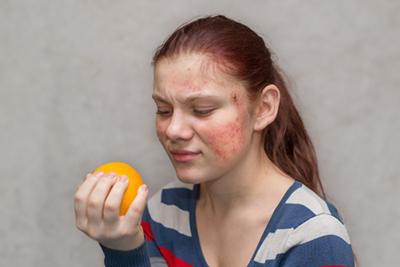
The health and beauty of your skin are affected by the diet you consume. Common skin conditions can also worsen, depending on your diet. Eczema is one of these skin conditions. Dr. Robert Lee at Premier Dermatology Clinic in Toms River, NJ, provides comprehensive dermatology services, including diagnosis, treatment, and management of eczema.
How Diet Can Affect Eczema
Eczema is also known as atopic dermatitis, and there are several factors which can make symptoms worse, including:
- Exposure to an allergen
- Chronically dry skin
- Immune system issues
- Chemical exposure and other environmental factors
- Genetic factors and a family history of eczema
Diet is another major factor in eczema flare-ups. Common foods that can make eczema symptoms worse include:
- Eggs
- Milk
- Citrus
- Wheat
- Soy
- Tomatoes
- Sugar
- Nuts
- Gluten
- Alcohol
The best way to determine if diet is playing a role in your eczema flare-ups is to do an elimination diet, removing the foods listed above from your diet. Your dermatologist can help you formulate a meal plan including lean protein, fresh fruits other than citrus, vegetables other than nightshade vegetables, and healthy oils.
Current research suggests omega-3 fatty acids can help with eczema symptoms, so eating fish including salmon and sardines, which are high in omega-3 fatty acids may be beneficial.
When you have an eczema flare-up, you can try several easy steps to get relief. Remember to:
- Take over-the-counter oral or topical antihistamine medications
- Apply calamine lotion to reduce itching
- Apply moisturizer after you take a shower
- Place cool, wet bandages or dressings on eczema patches
- Take daily oatmeal or baking soda baths
- Wear cool, loose, breathable clothing
For moderate to severe eczema flare-ups, your dermatologist can help with a variety of beneficial treatments, including:
- Prescription-strength topical and oral antihistamine medications
- Antibiotic medications to kill underlying bacteria
- Injectable or oral anti-inflammatory medications
- Topical and oral medications to relieve itching
- Corticosteroid dressings to relieve itching and inflammation
- Light therapy to reduce or eliminate eczema patches
Want To Know More About How Diet Affects Eczema?
To find out more about how diet affects eczema, and preventing eczema symptoms, call Dr. Robert Lee at Premier Dermatology Clinic in Toms River, NJ. You can reach him in the office by calling (732) 934-4141, so call today.
